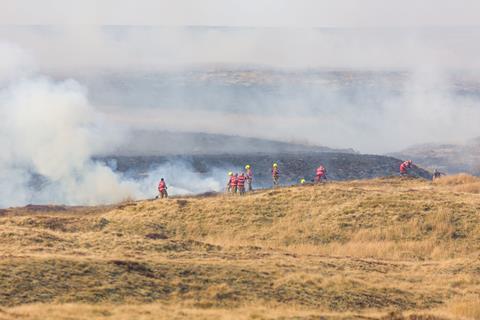After more than 400 wildfires so far this year, the National Sheep Association (NSA) believes that a discussion needs to be had about upland management and the consequences of destocking.

The National Sheep Association (NSA) is concerned that recent reductions in stocking rates of the UK’s uplands are having unintended consequences on wildfire risk across the country, and that the situation should be analysed by agriculturalists, environmentalists, and fire crews to limit the consequences of grassfires.
Record low rainfall
According to Met Office data, March 2025 was the driest since records began in some regions, with parts of south west England receiving just 4% of the long-term average rainfall. Across the whole of the UK, rainfall was 43% of the long-term average, increasing the fire risk across the country.
UK fire crews have announced that they have already responded to more than 400 wildfires this year, with fires burning as far afield as Stac Pollaidh in Scotland, Marsden and Howden Moors in the Pennines, the Welsh uplands, Cornish wildlife reserves, and the Mourne Mountains in Northern Ireland. This has led the NSA to call for discussions between fire crews, land managers and environmentalists.
“The spate of wildfires shows how challenging it is to get the balance of lower stocking rates and rewilding of uplands correct.”
Michael Priestley, NSA policy manager
NSA policy manager Michael Priestley explains: “Arson, camping accidents and general carelessness of the general public are often the causes of wildfires, but the fuel load is being increased by land management policies, including the trend of stopping controlled burns and destocking of uplands.
“The spate of wildfires shows how challenging it is to get the balance of lower stocking rates and rewilding of uplands correct. If the aim is to preserve the landscape, the only options are cutting, burning, and grazing, and if this is done by gamekeepers and farms, it is work that is done as part of economic activities. However, if the aim is to rewild and re-wet the landscape, this takes time.”
He adds: “Fire crews in Cumbria have called out moorland management as a factor contributing to the recent wildlife on Ralfland Common, near Shap. Those hills to the west of Shap have been destocked with sheep, it’s a widely known fact. Sheep manage vegetation and reduce the amount of dead grass and vegetation amassing on the fells.”
NSA expressed concerns that widespread wildfires pose a major ecological risk for rare wildlife, and states that destocking is also “placing rural communities under pressure and is risking the future of upland shepherding skills”.
Phil Stocker, NSA chief executive, comments: “It is important to recognise that traditional sheep farming and sensitive grazing by sheep can really help maintain vegetation to reduce the risk of wildfires.”















